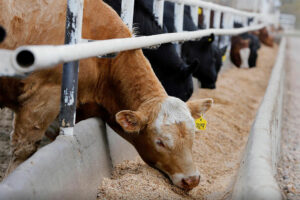Farm industry calls for more imports of raw materials for animal feed

By Luisa Maria Jacinta C. Jocson, Reporter
FARMERS called for increased imports of the raw materials used in animal feed, citing the need to provide relief to growers suffering from rising input prices in the wake of the Russia-Ukraine war and the logistics disruptions caused by the pandemic.
“The priority should be the ease of importing ingredients, not finished products. (That way,) we can keep the livelihoods here and have the by-products. As of the moment, I believe there is no need to import chicken. Too much importing will discourage poultry growers who are… taking on the extra challenges due to the Russia-Ukraine war and other global disruptions,” Feedmix Specialist II, Inc. Vice-President Norberto O. Chingcuanco said in a Viber message.
He added that the input costs have been rising due to the cost of soy and other proteins used in animal feed, as well as wheat.
“There are weather and disease related problems, in addition to the rising cost of feed. Then there is uncertainty over imports which discourages raisers from investing and rehabilitating or expanding their facilities. There could have also been a shift in demand from pork to chicken as a result of the high prices of pork,” Federation of Free Farmers National Chairman Raul Q. Montemayor added in a Viber message.
The price of whole chicken in Metro Manila markets increased by P25 from a month earlier to P200 per kilogram in June, according to the Department of Agriculture (DA).
Rising input costs have been an industry problem even before the onset of the pandemic and the crisis in Europe, according to United Broiler Raisers Association President Elias Jose M. Inciong.
“Even before the Ukraine war, prices of corn and soy already went up. In the case of local corn especially, corn farmers lost confidence because a large portion of their market, which was the hog industry, disappeared because of African Swine Fever,” he said.
Corn prices have risen to P22-P23 per kilogram from P14-P16 per kilogram in 2021, according to Mr. Inciong.
Soy likewise increased to P34-P36 per kilogram this year from P24-P26 per kilogram last year.
“This has impacted the performance of the broiler industry, whether terminal broiler farms or breeders. Right now, the day-old chicks that used to cost P28-P30 per kilogram now cost P38 pesos,” he said.
Due to poor production by the poultry sector, Mr. Inciong said that undersized chickens have proliferated and are now finding their way into the markets to meet demand.
“In the normal course of things, chicken below 1 kilogram is not sold. It’s too small. But now it can be sold. Because it is in short supply, even the poor-quality (birds) will have buyers because they want to continue production,” he said.
Fast food chains like Jollibee and McDonald’s have reported supply problems, particularly in procuring chicken that passes their quality standards.
Mr. Inciong said, “They won’t buy the runt chickens of course.”
In order to augment supply and solve the shortage for the long term, Mr. Inciong said that the government must look into policy reforms while consulting producers.
“This is the culmination of almost two and a half decades of the neglect of the agriculture sector. Every one of us will be paying for the price of wrong policies and false narratives,” he said.
“The more important step is for the government to interface with the frontliners and producers, because there are details in every industry that (the President) needs to know. They will be the first one to say what needs to be done,” he added.
President Ferdinand R. Marcos, Jr., who is also the Agriculture Secretary, said that the government might consider additional imports of chicken and pork to meet the growing demand and temper rising prices.
“With the African Swine Fever still affecting the pork industry and a shortage in feed posing a problem for the broiler industry, the Department of Agriculture (DA) may still look into importing minimal volumes of pork and chicken,” he said in a virtual briefing on Tuesday.
“Production is not sufficient. Our production is not sufficient in rice, corn, livestock and fisheries. That is why I made agriculture the highest priority of what we are doing because you cannot build a strong economy if you don’t have the foundation of a robust agricultural sector which assures food supply even in emergencies,” he added.
The DA, through the Bureau of Animal Industry (BAI), also announced that it has taken steps to increase production and stabilize supply and market prices.
“Among the measures being undertaken is allowing inter-island movement from mainland Luzon of day-old chicks, hatching eggs and ready-to-lay pullets. For day-old chicks and hatching eggs, movement is allowed provided they tested negative for 28 days from the date of sample collection. For ready-to-lay pullets, movement is allowed provided they tested negative 14 days from the date of sample collection,” it said.
The BAI has issued special import permits for vaccines in order to address poultry diseases such as Infectious Body Hepatitis.




